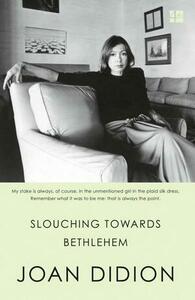Take a photo of a barcode or cover
i thought this book was really quite phenomenal. i was impressed by the white album -- which is why i gave this other classic a shot-- but i think slouching towards bethlehem slightly blows it out of the water.
i'm a big hater of travel literature: there's something awful (to me) about recounting places for the sake of recounting them -- almost like a striking an item off a checklist -- because of how distant it feels. in all fairness, this is probably because the minimal travel literature i've been exposed to has the writer chronicling their experience through the depiction of a landscape, a collection of the sounds (languages AND dialects included, of course), and maybe one or two anecdotes of the people there. it just seems clinical to me, and i read to feel more so than to catalogue.
there's also that frustrating thing about travel writers being very much a visitor in the space they write about, which (unjustly but undoubtedly) makes me feel like they're writing about a real place with the same approach as one might try to flesh out a fantasy setting.
because so much of didion's writing has to do with either california (and occasionally new york), she speaks with a firm sense of ownership, and there is a resultant earnestness in her writing that elevates it. i can't pretend to know why this is the case, but the book oozes sincerity. I'm not a fan of non-fiction at all, but this collection of "geographical" but personally involved writing punctuated by self-focused essays that are in equal parts honest and critical has firmly converted me to a didion-head
i think this book is wonderful, and have it mentally shelved as my accidental but continuing education on the terrible (in both senses of the word) west coast.
i'm a big hater of travel literature: there's something awful (to me) about recounting places for the sake of recounting them -- almost like a striking an item off a checklist -- because of how distant it feels. in all fairness, this is probably because the minimal travel literature i've been exposed to has the writer chronicling their experience through the depiction of a landscape, a collection of the sounds (languages AND dialects included, of course), and maybe one or two anecdotes of the people there. it just seems clinical to me, and i read to feel more so than to catalogue.
there's also that frustrating thing about travel writers being very much a visitor in the space they write about, which (unjustly but undoubtedly) makes me feel like they're writing about a real place with the same approach as one might try to flesh out a fantasy setting.
because so much of didion's writing has to do with either california (and occasionally new york), she speaks with a firm sense of ownership, and there is a resultant earnestness in her writing that elevates it. i can't pretend to know why this is the case, but the book oozes sincerity. I'm not a fan of non-fiction at all, but this collection of "geographical" but personally involved writing punctuated by self-focused essays that are in equal parts honest and critical has firmly converted me to a didion-head
i think this book is wonderful, and have it mentally shelved as my accidental but continuing education on the terrible (in both senses of the word) west coast.
informative
reflective
medium-paced
Not every essay in this collection was a win for me, and I skimmed though or skipped over a few, but the ones that did hit hit hard. Favorites here are:
Where the Kissing Never Stops
Slouching Towards Bethlehem
On Keeping a Notebook
Rock of Ages
Los Angeles Notebook
Goodbye to All That
Where the Kissing Never Stops
Slouching Towards Bethlehem
On Keeping a Notebook
Rock of Ages
Los Angeles Notebook
Goodbye to All That
informative
reflective
relaxing
medium-paced
challenging
emotional
reflective
medium-paced
emotional
funny
reflective
fast-paced
funny
informative
reflective
medium-paced
funny
informative
reflective
fast-paced
emotional
funny
informative
reflective
sad
medium-paced
all the cool girls i know have read didion books—i would like to join the club. i’ve read a few of her essays here and there, but never an entire collection. her prose is wonderfully crafted, very diaristic and precise, that dissects the disillusionment and counterculture in the 60s. the personal essays collections were some of her strongest, particularly ‘on keeping a notebook,’ while the rest weren’t outstanding but interesting nonetheless.
since i borrowed this epub from the library, here are some lines i highlighted:
“[…] a personality before she was entirely a person, and, like anyone to whom that happens, she is in a sense the hapless victim of what others have seen in her, written about her, wanted her to be and not be. the roles assigned to her are various, but variations on a single theme.”
“see enough and write it down. i tell myself, and then some morning when the world seems drained of wonder, some day when i am really going through the motions of doing what i am supposed to do, which is write—on that bankrupt morning i will simply open my notebook and there it will all be.”
“[…] when you are twenty-two or twenty-three, you figure that later you will have a high emotional balance, and be able to pay whatever it costs. i still believed in possibilities then, still had the sense […]”
since i borrowed this epub from the library, here are some lines i highlighted:
“[…] a personality before she was entirely a person, and, like anyone to whom that happens, she is in a sense the hapless victim of what others have seen in her, written about her, wanted her to be and not be. the roles assigned to her are various, but variations on a single theme.”
“see enough and write it down. i tell myself, and then some morning when the world seems drained of wonder, some day when i am really going through the motions of doing what i am supposed to do, which is write—on that bankrupt morning i will simply open my notebook and there it will all be.”
“[…] when you are twenty-two or twenty-three, you figure that later you will have a high emotional balance, and be able to pay whatever it costs. i still believed in possibilities then, still had the sense […]”





